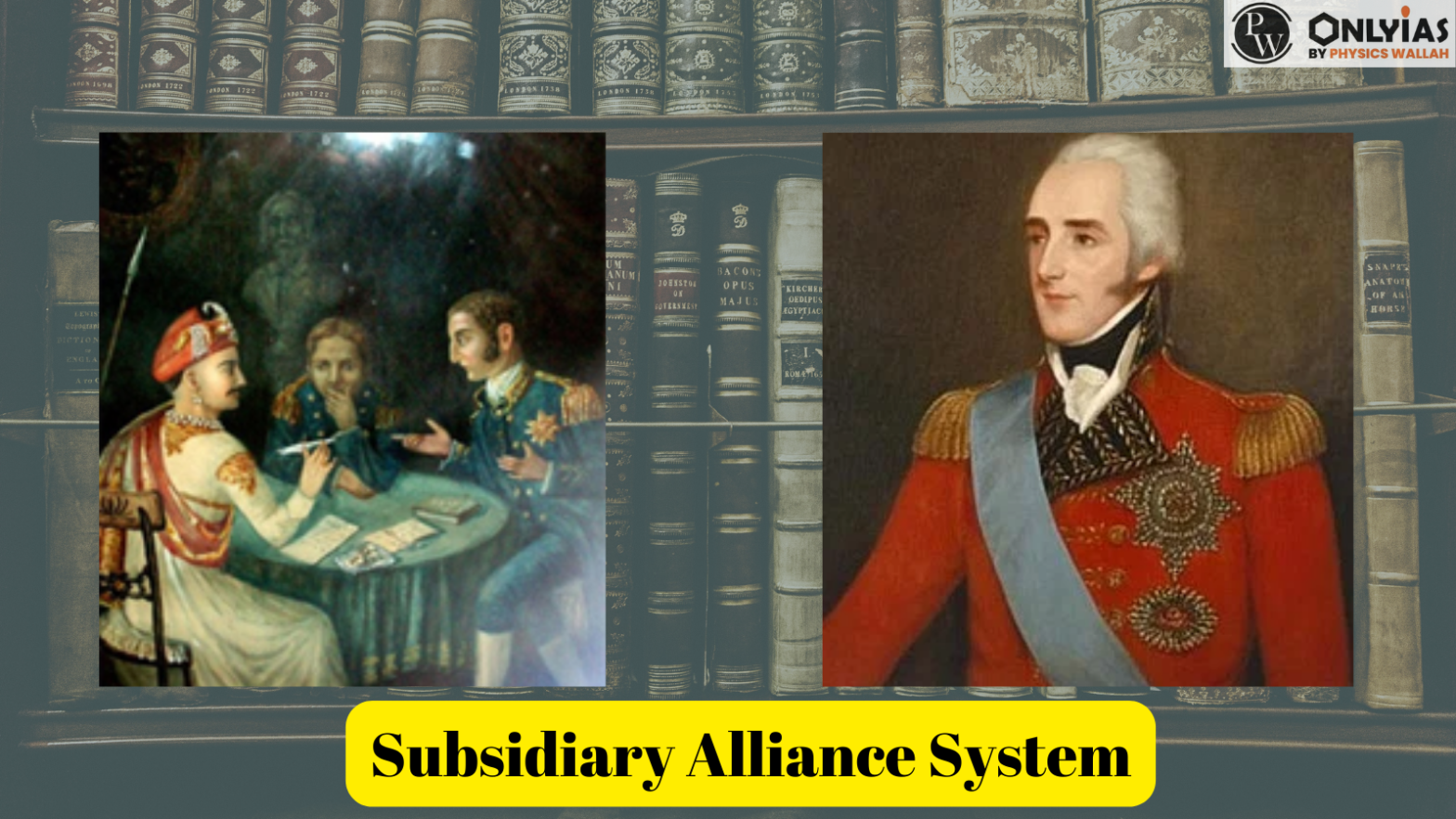Explore the Subsidiary Alliance System (1798) by Lord Wellesley, shifting power to the British East India Company, and its impact on Indian sovereignty and politics.

The British East India Company used the Subsidiary Alliance System, which Lord Wellesley founded in 1798, to exercise control over Indian princely kingdoms. It was a series of agreements in which Indian rulers accepted British protection in return for the maintenance of a British military inside their territories. This approach undermined the sovereignty of these governments, which eventually resulted in British dominance.
Subsidiary Alliance System: The Subsidiary Alliance System was an arrangement believed to have been established between the British East India Company and Indian princely states, which marked a shift in power dynamics from Indian kingdoms to the British. This policy played a crucial role in the formation of the British Empire in India.

During his tenure as the Governor-General of India from 1798 to 1805, Lord Wellesley promoted the concept of subsidiary alliances. The term itself was coined by Marquis Dupleix, a French Governor-General. The Nawab of Awadh was the first ruler to enter into a subsidiary alliance following the War of Buxar, while the Nizam of Hyderabad established the first significant subsidiary alliance.
The Subsidiary Alliance System, introduced by Lord Wellesley, entailed an agreement between the British East India Company and the princely states of India. In exchange for protection, the princely states ceded their sovereignty to the British under this system.
Subsidiary Alliance System: The concept of the subsidiary alliance was initially developed by Governor Joseph Francois Dupleix of the French East India Company. However, it gained prominence under the tenure of Lord Wellesley, who, during his rule from 1798 to 1805, shifted from a policy of non-intervention to establishing subsidiary alliances. This strategic shift significantly bolstered British influence in India.
Lord Wellesley, India’s governor-general from 1798 to 1805, primarily administered the Subsidiary Alliance system. Although the French Governor-General Marquis Dupleix was the first to use the idea, Lord Wellesley was the one who formalized and widely implemented it as a crucial strategy for extending British power and influence over Indian states.
Under the terms of the subsidiary alliance, the ruler of an Indian princely state had to allow a British military presence within their territory and provide financial support for the stationed troops. Additionally, the ruler had to disband their own military forces and permit British forces in their domain to form a subsidiary alliance.
The ruler was also responsible for funding the maintenance of the British troops. Failure to do so could result in the transfer of their land to the British. In return, the British pledged to safeguard the Indian state from external threats and internal uprisings, although this promise was often not upheld.
Last-Minute 15 Amazing Preparation Tips for UPSC Mains Exam
The Indian state was prohibited from forming alliances with other foreign powers and was limited to employing Englishmen as foreign advisors. This policy aimed to diminish French influence. Ultimately, the Indian ruler’s authority over military and foreign affairs was greatly diminished, transforming them into a British “protectorate.” A British representative was also placed at the Indian court.
The Subsidiary Alliance System reshaped the power dynamics between Indian princely states and the British East India Company, altering the course of Indian history and influencing the growth of the British Empire in the region.
The Subsidiary Alliance can be described as an agreement between the British East India Company and the princely states of India, resulting in the transfer of sovereignty from the Indian kingdoms to the British. This treaty played a significant role in the establishment and expansion of the British Empire in India.
Lord Wellesley implemented the principle of subsidiary alliance. As per the conditions of this alliance, Indian rulers were prohibited from maintaining their own separate military forces.
The main objective of the Subsidiary Alliance system was to establish British control over Indian princely states by maintaining a British military presence, controlling foreign affairs, and gradually eroding their autonomy. This strategy helped the British East India Company expand its influence and dominion in India during the 18th and 19th centuries.
The first major implementation of the Subsidiary Alliance system in India was with the state of Hyderabad. In 1798, the Nizam of Hyderabad, Mir Osman Ali Khan, entered into a Subsidiary Alliance with the British East India Company. This agreement allowed the British to station their troops within Hyderabad, control its foreign policy, and gradually exert influence over its internal affairs. This marked the beginning of the Subsidiary Alliance system's application in India.
The British East India Company upheld a significant permanent military force, funded by the Indian rulers. Having the Company's soldiers stationed in numerous states enabled them to effectively counter French activities.
<div class="new-fform">
</div>
